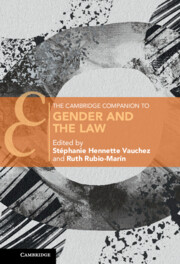Book contents
9 - The Familial Subject
from Part III - Communities
Published online by Cambridge University Press: 19 January 2023
Summary
Lawyers, judges and scholars often see the domain of the family as distinctive, namely as affective rather than instrumental, sharing rather than distributive, distinguished from the functioning of both the state and the market by its altruism, intimacy and sacredness. They also often consider family law as exceptional, as occupying a distinctive domain and operating differently than its private law counterparts such as contracts, torts and property law or its public ones such as criminal, administrative and constitutional law.1 We begin from the premise, however, that the law that regulates and shapes the experiences and situations of members of a family arises, too, in these other domains. Family law encompasses not just the rules and doctrines associated with the formation, operation and dissolution of families (traditional family law) but also laws of the market and the state that regulate and shape the definition and operation of families.2
- Type
- Chapter
- Information
- The Cambridge Companion to Gender and the Law , pp. 302 - 335Publisher: Cambridge University PressPrint publication year: 2023



